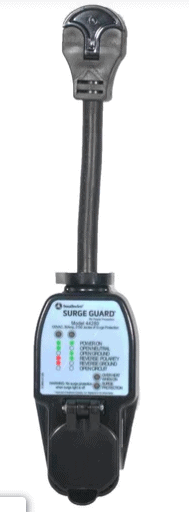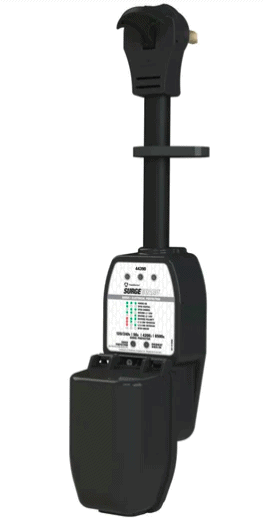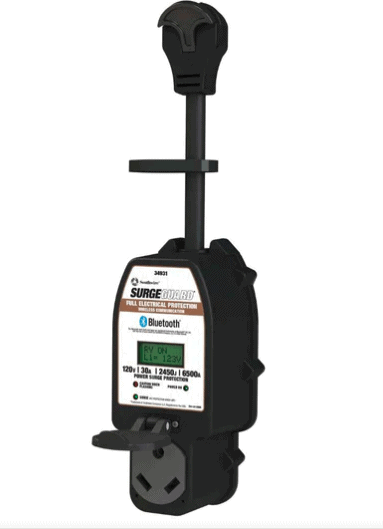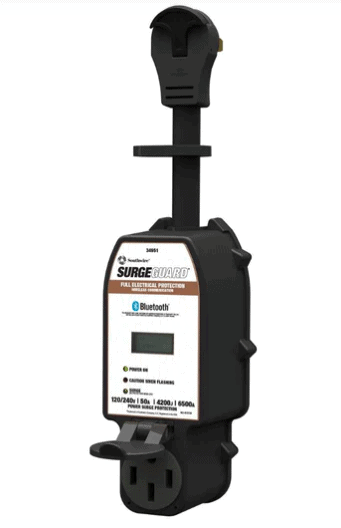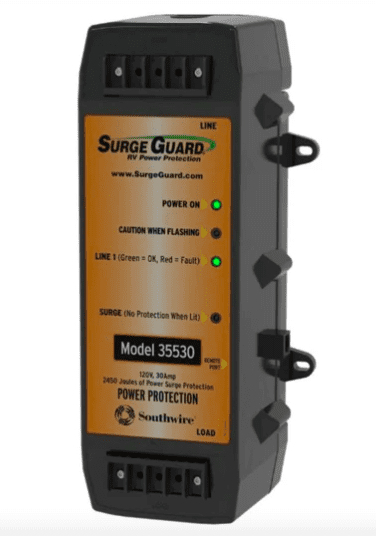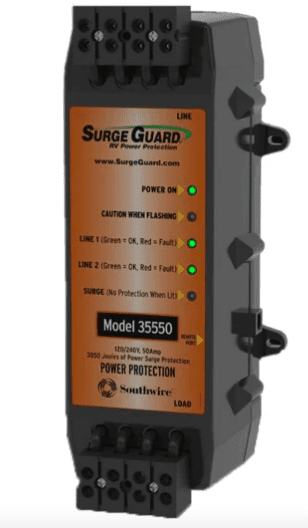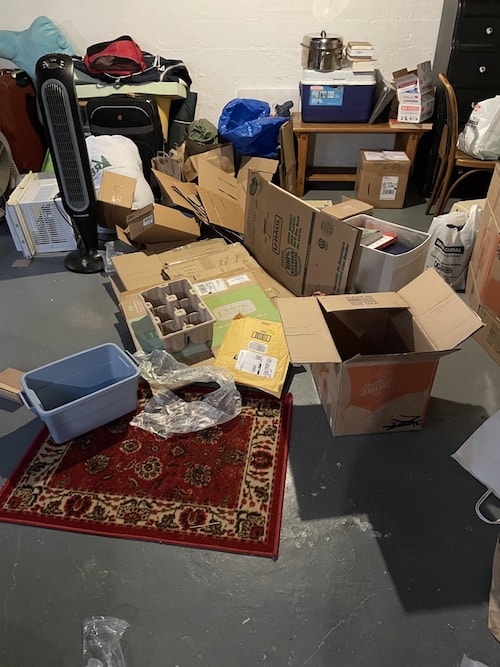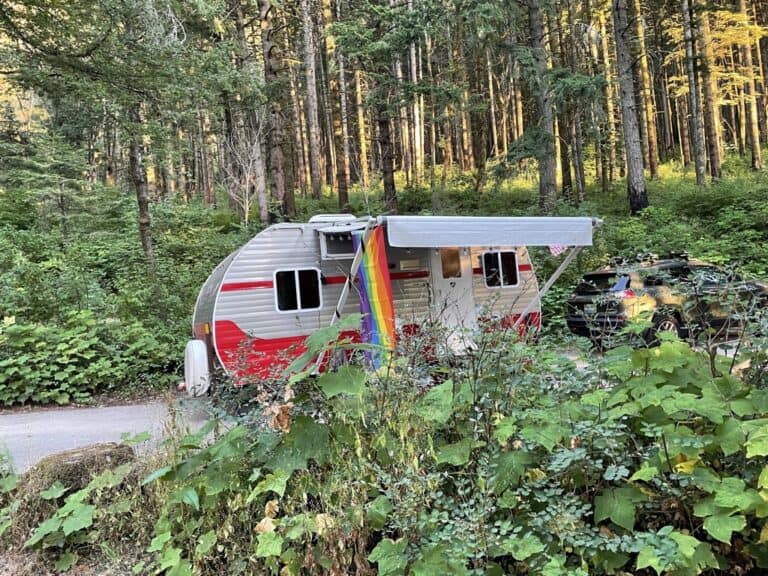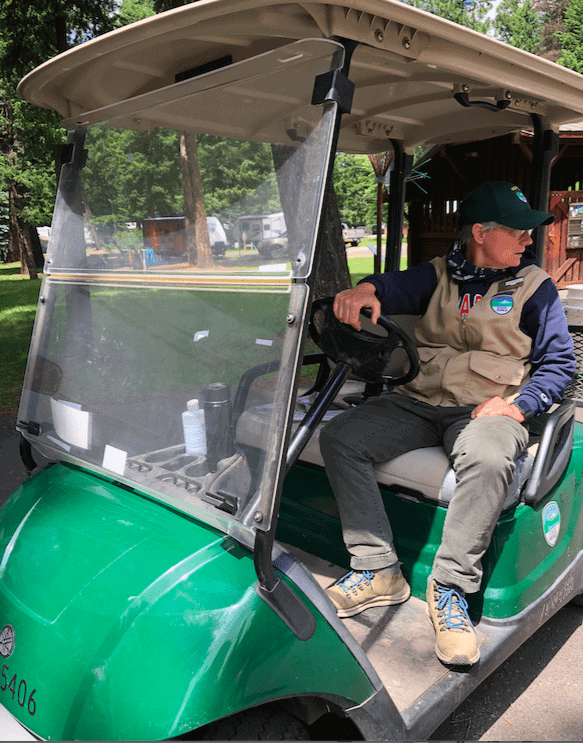Do I need a Surge Protector for my RV? Everything You Need to Know

Everything You Need to Know About RV Surge Protectors
Do you need a surge protector for your RV? The answer is most likely yes. Anytime you plug your RV into a power outlet, whether it be at home, at a campground or anywhere else, you’ll want to protect the electrical equipment in your RV from dangerous power surges.
Power surges can happen during thunder and lightning storms, but also at times when the power grid is taxed. Imagine a hot summer day when everyone is running their air conditioning. With everyone plugged in, this can be a big drain on the power system and can impact the power coming into your RV. If there is a big pull or drain from the system or a sudden spike, that can damage anything you have plugged in, including your RV refrigerator, air conditioner and anything you have plugged into your outlets—computers, TVs, tablets or phones.
You might not need a surge protector for every camping situation, but it is definitely something that is good to have in your RV toolbox to use whenever you’re plugged into shore power. Read on to find out more.
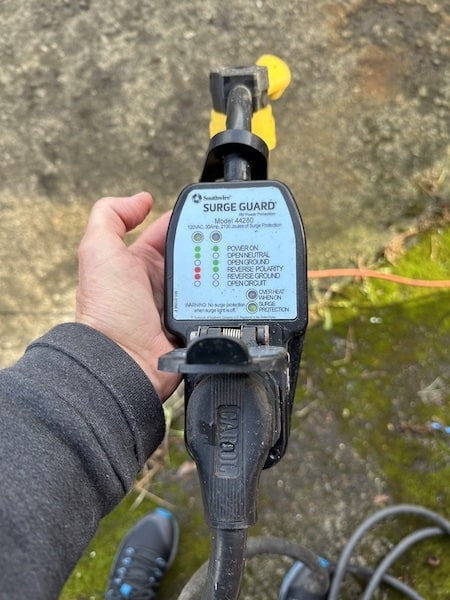
What do Surge Protectors Do?
Surge protectors are devices that go between your RV’s electrical system and the power source you are plugged into, to protect it from dangerous voltage spikes that can damage your RV’s electrical equipment.
What’s the Difference between a Surge Protector and a Power Strip?
Although we might think of power strips and surge protectors as synonymous, a power strip simply add extra outlets, while a surge protector adds extra protection.
What about the power strips you have in your home? Are those adequate for your RV?
It’s recommend that you use a surge protector with the same amperage as your RV. So if you have a 30 amp system, you should use a 30 am surge protector. The surge protector power strips you buy from the hardware store or Amazon are likely rated for your home power, which is 15 or 20 amps. This will not provide adequate protection for your RV.
You can, however, use a home surge protector inside your RV to plug in your personal electronics for extra protection and extra outlets.
Why You Need an RV Surge Protector
Unlike in your home, where you can likely be pretty confident that your wiring is installed correctly and up to date, you just don’t know what you’re going to get at the campground or RV park. Many parks are older and wiring can go bad—especially when it’s outdoors and exposed to the elements. Even a new RV park with new facilities can have faulty electrical equipment.
Some RV parks may not be set up to handle the strain on the power grid when everyone in the park is pulling from it—especially on a hot day when everyone in the park has their air conditioners running. Even your location inside the park can impact the quality of your power supply. The further away you are from the main power source, the more likely it is there could be something in the line to compromise your flow of electricity.
Power surges can damage your RV’s electrical system and appliances. Surge protectors can be expensive ($100-$300), but not as costly as having to replace one of your appliances or RV wiring.

Do you need a 30 amp or 50 amp Surge Protector?
Your surge protector should match the amperage of your RV. So if you have a 30 amp RV, you’ll need a 30 amp surge protector. If your RV uses 50 amps, get a 50 amp surge protector.
What’s the difference between a Surge Protector and an EMS?
Surge protectors and EMS (electrical management system) are both devices designed to protect your RV’s electrical systems, but they work in different ways and provide different levels of protection.
A surge protector will protect your RV from sudden voltage spikes. It works by diverting excess voltage away from your RV’s electrical system and safely grounding it.
An EMS is more advanced and provides a more comprehensive protection for your RV’s electrical system by protecting not just against power surges, but also low voltage, reverse polarity and open grounds. Depending on the unit, they may even monitor the power supply, and turn off when there is an issue and turn back on if it returns to normal.
In addition to protecting against power surges, an EMS can also detect low voltage. Low voltage can be damaging to appliances, such as your air conditioner, putting a strain on the system, potentially causing it to overheat or burn out.
An EMS can also detect reverse polarity and open grounds. It will disconnect the power to your RV to save your valuable electronics.
What is a hard wire Surge Protector?
A hard wire surge protector is installed in your RV so that you know you’re protected any time you plug into shore power. With a hard wire system, you can be confident that you are protected, without having to check each time. Plus, with it wired into your rig, you lower your risk of having it stolen.
What is a portable surge protector?
A portable surge protector is one you can connect and disconnect to the power pedestal each time come into a new campground. Portable protectors are usually cheaper and easy to use—literally plug and play. You can also take it with you if you change rigs.
What’s the Best Surge Protector?
Surge Protector: Good Option
This is the surge protector I have. It protects from surges and will indicate if there is faulty power, but will not protect against it. It’s a good option for travel trailers and small RVs.
Surge Protector: Better Option
These surge protectors are Total EMS systems that provide the best level of protection for your RV and components. They will protect against poorly wired pedestals, surges, low voltage and bad power coming from inside your RV. If for any reason the unit fails, Southwire will not only replace the unit, but will pay for any damage caused inside your RV.
Surge Protection: Best Option:
With a hard wired EMS system, once it’s installed, you don’t have to worry about it getting stolen or wet. It protects against open ground, open neutral, low and high voltage, reverse polarity and a mis-wired pedestal.
How to keep my surge protector from getting stolen?
Personally, I’ve never had an issue with theft at campgrounds. But if you want to be safe and secure your purchase, you can lock them to the power pedestal with a simple bike cable lock. Many portable surge protectors and EMS systems have a loop that the cable will fit through.
Do I need a surge protector if I boondock or am off-grid?
A surge protector is needed for when you are connect to shore power, so if you’re boondocking and off grid, there will be no need for surge protection. However, it’s good to have a protector in your arsenal for those times you are connected to shore power.
Do I need a surge protector if I use my generator?
Surge protection is a good idea of your generator is having trouble or is old. It might not be producing the right amount of wattage output, which can be damaging to your RV’s` electrical system.
Does a 30 amp RV need a surge protector?
All RVs, regardless of their amperage can benefit from the protection of a surge protector or EMS system.
What happens if you don’t have a surge protector?
If you don’t have a surge protector, you’re risking damage to your electronic components. It’s like driving with no insurance. You don’t need to use your insurance until you get into an accident. When you do have an accident, you’re sure glad you have insurance. You may never plug into a power source with voltage issues, but if you ever do, you’ll be thankful for the protection. Replacing expensive electronic equipment will greatly outweigh the cost of the most expensive EMS system.
Can a power surge damage an RV?
Yes, power surges can damage anything inside your RV that runs on power. This can include your water pump, your air conditioner, your fans, your refrigerator, your
What else should I know about surge protectors?
Not all surge protectors are waterproof. If water gets in the inner electrical workings of the surge protector, it can cause a short which can lead to a potentially dangerous situation known as “hot skin,” where your coach is being electrified. This can cause a small zap when you touch it, or in some cases may even lead to electrocution.
Conclusion: RV Surge Protectors
It’s better to be safe than sorry when it comes to the electrical systems in your RV and even your own safety. It’s best to buy the best surge protector or EMS system that you can afford. See our recommendations above.
Thanks to Carrie Silverhorn, certified RV technician for reviewing this article for accuracy.


